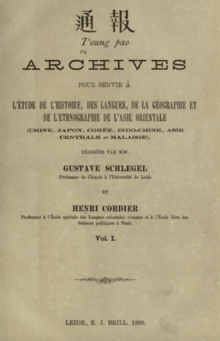T'oung Pao
 Cover of first volume (1890) | |
| Discipline | Sinology |
|---|---|
| Language | English, French, and German |
| Edited by | Pierre-Étienne Will, Martin Kern, and Paul Kroll |
| Publication details | |
Publication history | 1890-present |
| Publisher | |
| Frequency | 5 issues per year |
| Standard abbreviations | |
| T'oung Pao | |
| Indexing | |
| ISSN |
0082-5433 |
| Links | |
| T'oung Pao | |||||||||||||
| Traditional Chinese | 通報 | ||||||||||||
|---|---|---|---|---|---|---|---|---|---|---|---|---|---|
| Simplified Chinese | 通报 | ||||||||||||
| |||||||||||||
T’oung Pao ([tʰʊ́ŋ.pâu]; Chinese: 通報; pinyin: Tōngbào; literally: "Messages, Circulars"), founded in 1890, is a Dutch journal and the oldest international journal of sinology.
T'oung Pao's original full title was T’oung Pao ou Archives pour servir à l’étude de l’histoire, des langues, la geographie et l’ethnographie de l’Asie Orientale (Chine, Japon, Corée, Indo-Chine, Asie Centrale et Malaisie) ("Tongbao or Archives for Use in the Study of the History, Languages, Geography, and Ethnography of East Asia [China, Japan, Korea, Indochina, Central Asia, and Malaysia]"). It is published by the Leiden publisher E. J. Brill.
The first co editors-in-chief were Henri Cordier and Gustav Schlegel. Traditionally, T'oung Pao was co-edited by two sinologists, one from France and one from the Netherlands. However, the tradition has been discontinued: the current editors are Pierre-Étienne Will (French – Collège de France), Martin Kern (German – Princeton University), and Paul Kroll (American – University of Colorado Boulder).
List of past editors
- Dutch
- Gustav Schlegel (1890–1903)
- J.J.L. Duyvendak (1934–1954)
- A.F.P. Hulsewé (1954–1975)
- French
- Henri Cordier (1890–1925)
- Édouard Chavannes (1904–1916)
- Paul Pelliot (1920–1942)
- Paul Demiéville (1945–1975)
References
- An introduction of the journal in Chinese
- Henri Cordier, Gustaaf Schlegel, Édouard Chavannes, Paul Pelliot, J.J.L. Duyvendak, Paul Demiéville (1902). Tʻoung pao: Tʻung pao. E. J. Brill. Retrieved 2011-07-01.
- T'oung pao. E. J. Brill. 1900. Retrieved 2011-07-01.
External links
- The journal's website at Brill's site
- T'oung Pao, Vol. I, first issue, 1890.
- Some early volumes of the journal on archive.org (through volume 21, dated 1922); ISSN 0082-5433 1568-5322 0169-832X